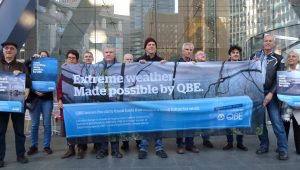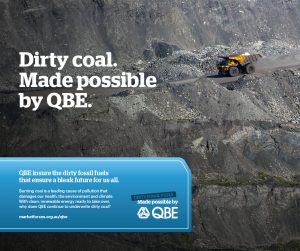
23 October 2018
Remember that time in high school when your best friend abandoned you to go hang out with the popular kids? Even though the popular kids were really mean and smoked a lot?
Sorry to be the bearer of bad news but it’s happening again, only this time it’s your insurer abandoning you to go off with coal, oil and gas companies in the midst of a climate emergency.
The role of insurance companies in the expansion of fossil fuel infrastructure is often overlooked. As investors and underwriters, these companies are crucial for helping coal, oil and gas projects get built. This support for fossil fuels generates a cruel irony as the use of fossil fuels is driving global warming, which fuels the extreme weather events that hit the profits of insurers, threaten their business model and force up premiums for their customers.
Some insurers like Allianz and AXA seek to end this vicious cycle by stopping their support for the coal industry. But not QBE, Australia’s biggest global insurer. Finding itself in a hole, QBE is still digging. Problem is, the rest of us are in that hole too.
Global warming fuels extreme weather
The overwhelming evidence shows that global warming is fueling ever-worsening heatwaves, bushfire, floods and storms. Average temperatures are rising with more extremely hot days and harsher fire-weather conditions. In New South Wales climate change is increasing bushfire risk, with the estimated economic cost from fires set to double by 2050.
Climate change is also intensifying the severity and reach of cyclones, exposing more property and infrastructure to higher risks, even in regions which have not had cyclones before. Temperate climate zones are now more likely to experience extreme rainfall and more flooding, displacement of communities and increased incidence of vector-borne disease. Sea level rise is amplifying the effects of storm surges.
QBE insures coal, oil and gas expansions

Instead of protecting customers from these disasters, insurance companies like QBE are adding fuel to the fire through investing and underwriting fossil fuels. Conservative estimates are that QBE earns $300-350 million of revenue per year from insuring coal mines, coal-fired power stations, tar sands extraction, oil rigs and gas pipelines. (QBE does not disclose the exact figure). Obtaining insurance is often an essential step in the building of many fossil fuel projects.
QBE also funds the activities of coal, oil and gas companies through its US$23 billion investment portfolio.
Extreme weather hits insurers and their customers
QBE’s business model is being impacted by ever-worsening extreme weather events. According to Munich Re, during the three decades to 2012 Australian weather-related insurance losses rose fourfold. Swiss Re’s research estimates that insured losses from natural catastrophes and man-made disasters cost $144bn last year, making it the most expensive year so far. QBE itself reported a US$1.2 billion loss in 2017, mainly due to extreme weather. Climate change is rendering risk models obsolete, as future risk can no longer be calculated based on past events.
All of this results in ordinary people paying more for their insurance. Between July 2005 and June 2013, home and contents insurance premiums in North Queensland increased by 80% due to extreme weather events and increases in the cost of catastrophe reinsurance. The North Australia Insurance Premiums Taskforce found that insurance premiums have significantly risen to reflect the high risk of damage due to cyclones.
Yet insurance premiums can’t keep rising indefinitely if people are expected to keep paying them. Ernst Rauch, the head of the Corporate Climate Centre at Munich Re worried in 2017 that insuring against weather-related disasters could reach unaffordable levels for households and companies.
Some households a re just not being insured for some events. The Queensland Floods Commission of Inquiry noted that after the flood disaster of 2010-11, 88% of Australian households held home and contents policies that didn’t cover riverine flood. An extensive study of over 40 general insurers found that although some offered partial coverage for erosion and seawater inundation due to storm surge, no insurers offered products that cover loss or damages due to gradual sea-level rise. The Department of Climate Change and Energy Efficiency found in 2011 that more than $226 billion worth of residential, commercial, industrial, road and rail assets are at risk of inundation and shoreline erosion for a sea level rise of 1.1m, none of which, it seems, are insured for these impacts.
re just not being insured for some events. The Queensland Floods Commission of Inquiry noted that after the flood disaster of 2010-11, 88% of Australian households held home and contents policies that didn’t cover riverine flood. An extensive study of over 40 general insurers found that although some offered partial coverage for erosion and seawater inundation due to storm surge, no insurers offered products that cover loss or damages due to gradual sea-level rise. The Department of Climate Change and Energy Efficiency found in 2011 that more than $226 billion worth of residential, commercial, industrial, road and rail assets are at risk of inundation and shoreline erosion for a sea level rise of 1.1m, none of which, it seems, are insured for these impacts.
When you’re in a hole, stop digging
Responding to investor pressure on climate risk disclosure, QBE announced in August that it would review its investing and underwriting strategies. However, it shouldn’t take a review to conclude that it’s in the interest of QBE, its shareholders, customers and everyone else to stop the expansion of fossil fuels.
With extreme weather hitting communities more often and more severely and insurance to protect property from that extreme weather becoming ever-more expensive, it is indefensible that an insurance company remains part of that vicious cycle.
QBE’s role as an insurance company is to help reduce and manage risk for its customers. By underwriting and funding the expansion of the industries most responsible for the climate crisis it is currently failing miserably in this role.
QBE itself reported a US$1.2 billion loss in 2017, mainly due to extreme weather.
Thank you to our volunteer Paulina Valdes for assisting with the research for this piece.
